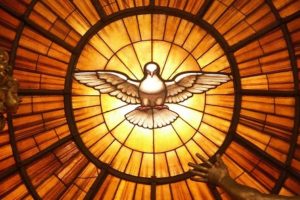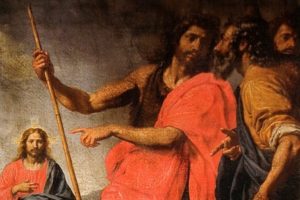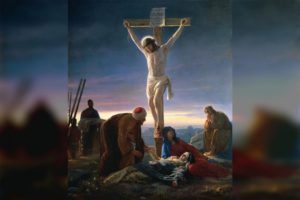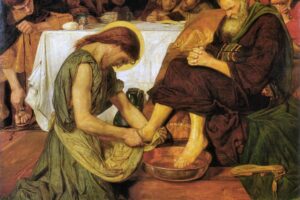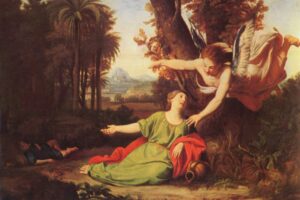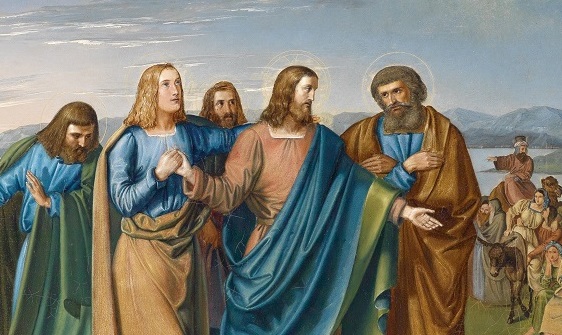Last edited on 6/Jul/2023
The Bible’s Answer
Introduction
When this article talks about “women’s ordination”, it’s specifically referring to women being ordained into the office of pastor, not the office of deaconess. In the New Testament, the office of pastor is called “overseer/bishop” (from ἐπίσκοπος, episkopos) or “elder/presbyter” (from πρεσβύτερος, presbuteros) (see Ac 14:23; 20:28; 1Tim 3:1–7; Ti 1:5–9). While the terms “overseer” and “elder” are not brought up in the Gospels in regards to pastors, the office of apostle is, which is from ἀπόστολος (apostolos), meaning “one sent out”.[1] According to the New Testament, the twelve apostles were all elders (pastors) (Ac 15:6, 22; 1 Pet 5:1–2), so, in this way, the Gospels do refer to the office of pastor.
The Lord Jesus’ Stance on Ordination
The Gospels tell us that the Lord Jesus Christ called and ordained (ἐποίησεν [epoieisen] in the Greek, which means “he ordained” or “appointed”)[2] twelve men as apostles, whom he sent out to preach and cast out demons. St Mark says:
And [Jesus] went up on the mountain and called to him those whom he desired, and they came to him. And he appointed twelve (whom he also named apostles) so that they might be with him and he might send them out to preach and have authority to cast out demons. He appointed the twelve: Simon (to whom he gave the name Peter); James the son of Zebedee and John the brother of James (to whom he gave the name Boanerges, that is, Sons of Thunder); Andrew, and Philip, and Bartholomew, and Matthew, and Thomas, and James the son of Alphaeus, and Thaddaeus, and Simon the Cananaean, and Judas Iscariot, who betrayed him. (Mark 3:13–19, ESVUK)
It is these same twelve apostles (with the obvious exception of Judas Iscariot) with whom Jesus exclusively met at the end of his earthly ministry, to commission them to baptise and teach all nations, as leaders of the New Covenant Church. St Matthew says:
Now the eleven disciples went to Galilee, to the mountain to which Jesus had directed them. And when they saw him they worshipped him, but some doubted. And Jesus came and said to them, “All authority in heaven and on earth has been given to me. Go therefore and make disciples of all nations, baptizing them in the name of the Father and of the Son and of the Holy Spirit, teaching them to observe all that I have commanded you. And behold, I am with you always, to the end of the age.” (Matthew 28:16–20)
These twelve men are the only people whom Jesus called and ordained as apostles in his earthly ministry, and so Jesus, who is God Almighty in the flesh (Jn 1:1–3, 14), restricted the pastoral office to men only. It’s important to note that Jesus highly exalted women when he walked the Earth. Jesus defended a woman who was unfairly criticised (Mt 26:10–13), valued Mary Magdalene’s testimony as equally as a man’s (Jn 20:17), saved an adulterous woman’s life who was harshly condemned (Jn 8:7–11), and in general talked with both women and men as equals (Jn 4:27–29). In light of this, Jesus could have easily ordained Mary Magdalene as an apostle, or Joanna, or Suzanna, or his mother if he wanted to. But he didn’t; he specifically and intentionally chose all men. Why? Because, as he said in his High Priestly Prayer, his choice of the twelve was all in accordance with the eternal will of God the Father. He said:
And now, Father, glorify me in your presence with the glory I had with you before the world began. “I have revealed you to those whom you gave me out of the world. They were yours; you gave them to me and they have obeyed your word. Now they know that everything you have given me comes from you. … As you sent me into the world, I have sent them into the world. (John 17:5–7, 18)
Just as Jesus faithfully followed his heavenly Father in appointing twelve men as apostles, St Paul, Christ’s apostle (1Cor 1:1), faithfully followed his Lord, Jesus, by only allowing certain qualified men to enter into the pastoral office (1 Timothy 2:11–15; 3:1–7; Ti 2:5–9; see also 1Cor 14:33–38).
Let a woman learn quietly with all submissiveness. I do not permit a woman to teach or to exercise authority over a man; rather, she is to remain quiet. For Adam was formed first, then Eve; and Adam was not deceived, but the woman was deceived and became a transgressor. Yet she will be saved through childbearing—if they continue in faith and love and holiness, with self-control. The saying is trustworthy: If anyone aspires to the office of overseer, he desires a noble task. Therefore an overseer must be above reproach, the husband of one wife, sober-minded, self-controlled, respectable, hospitable, able to teach, …. (1 Timothy 2:11–15; 3:1–2)
This does not in any way make women (or men who are not called to be pastors) inferior to men who are called to be pastors, as if the office of pastor were some kind of litmus test for a person’s worth (which is a horrible distortion of the truth). It is simply a biblical example of the fact that women are not the same as men, and that while both are equal in God’s eyes (Gen 1:27), they also have their own unique God-given roles and responsibilities (e.g. Eph 5:22–33), which should be honoured, not denigrated.
However, there are some people who say that while the Lord Jesus did indeed restrict the apostles to just men, he nevertheless permitted women to perform the necessary functions of a pastor. Therefore, they argue, women should be ordained as pastors. Since one of the primary functions of a pastor is teaching and exercising authority over a congregation specifically during public church worship, the remainder of this article will examine if the Gospels do, indeed, endorse women to do such a thing.
Mary Proclaimed the Gospel (John 20:17–18)
Perhaps the most commonly cited Gospel passage in support of this is John 20:17–18, which takes place shortly after Jesus rose from the dead and appeared first to his disciple, St Mary Magdalene. It says:
Jesus said to her, “Do not cling to me, for I have not yet ascended to the Father; but go to my brothers and say to them, ‘I am ascending to my Father and your Father, to my God and your God.’” Mary Magdalene went and announced to the disciples, “I have seen the Lord”—and that he had said these things to her. (John 20:17–18)
This passage is a wonderful example of one of Jesus’ female disciples faithfully proclaiming the Gospel to fellow believers. Matthew 28:1–2, 7–8, Mark 16:9–11, and Luke 24:8–11 say exactly the same thing, except Matthew and Luke also mention that there were some other women with her. But Mary and the other women’s proclamation did not take place during public church worship. Therefore, it cannot be used as a proof text for the ordination of women. It’s also worth noting that Mary proclaiming the Gospel to others, in other words, evangelism, is not a task that’s exclusively for pastors. Jesus commands all people, whether they’re pastors or not, to acknowledge him before others:
And I tell you, everyone who acknowledges me before men, the Son of Man also will acknowledge before the angels of God, but the one who denies me before men will be denied before the angels of God. (Luke 12:8–9)
Jesus was not ordaining Mary into the pastoral office in John 20, in the same way that he wasn’t ordaining the formerly demon-possessed man into the pastoral office by telling him to proclaim how much he had done for him:
The man from whom the demons had gone begged that he might be with him, but Jesus sent him away, saying, “Return to your home, and declare how much God has done for you.” And he went away, proclaiming throughout the whole city how much Jesus had done for him. (Luke 8:38–39)
In these examples, location and situation are the two key factors for ascertaining that Mary and the formerly demon-possessed man did not perform an exclusive function of pastors. Jesus, on the other hand, did perform the exclusive work of a pastor, because he proclaimed the Gospel and exorcised demons from people in the synagogues, during public worship. For example, Mark 1:39 says, “And [Jesus] went throughout all Galilee, preaching in their synagogues and casting out demons.”
Some Women Followed Jesus (Luke 8:1–3)
Another Gospel passage that could be cited regarding this is Luke 8:1–3, which talks about Jesus’ mission work and his travel companions. It says:
Soon afterwards he went on through cities and villages, proclaiming and bringing the good news of the kingdom of God. And the twelve were with him, and also some women who had been healed of evil spirits and infirmities: Mary, called Magdalene, from whom seven demons had gone out, and Joanna, the wife of Chuza, Herod’s household manager, and Susanna, and many others, who provided for them out of their means. (Luke 8:1–3)
As we can see, this passage highlights that in addition to the twelve apostles, there were also some women who followed Jesus throughout his ministry, “who provided for them out of their means”. The word for “provided” here is “διηκόνουν” (dieikonoon), which means “to be an attendant, i.e. wait upon (menially or as a host, friend, or (figuratively) teacher)”.[3] The word for “means” is “ὑπαρχόντων” (hooparkhontown), which means “things extant or in hand, i.e. property or possessions:—goods, that which one has, things which (one) possesseth, substance, that hast.”[4] In other words, Luke is saying that the women generously provided for Jesus and the twelve’s physical and material needs. It says nothing about them preaching during public church worship, so again, this passage cannot be used as a proof text for women’s ordination.
It’s worth noting that we get the word “deacon” from the same word used in the text, “διηκόνουν” (dieikonoon). This is an office that the twelve established to provide for the physical and material needs of Christians, so that the twelve could “devote [themselves] to prayer and to the ministry of the word” (Ac 6:4). It was this same position that Phoebe held, who also provided for the Church’s physical and material needs as a deaconess (see Rm 16:1–2).
Furthermore, the task of following Jesus, like the women did here, is also not exclusive to pastors. Jesus commands all people to follow him:
And he said to all, “If anyone would come after me, let him deny himself and take up his cross daily and follow me. For whoever would save his life will lose it, but whoever loses his life for my sake will save it. (Luke 9:23–24)
As stated under the previous heading: location and situation are key. If an example were given of a woman in the Bible teaching and preaching during public church worship, then proponents of women’s ordination might have a point. But such a passage does not exist—not only in the Gospels, but the entire Bible. In the Gospels, Jesus never commissioned a woman to preach in public church worship, nor does he ever endorse this teaching.
Anna the Prophetess (Luke 2:36–38)
The following two Gospel passages are also worth examining. The first is Luke 2:36–38, which mentions a prophetess called Anna, who gave thanks to God upon seeing the Baby Jesus:
And there was a prophetess, Anna, the daughter of Phanuel, of the tribe of Asher. She was advanced in years, having lived with her husband seven years from when she was a virgin, and then as a widow until she was eighty-four. She did not depart from the temple, worshipping with fasting and prayer night and day. And coming up at that very hour she began to give thanks to God and to speak of him to all who were waiting for the redemption of Jerusalem. (Luke 2:36–38)
Indeed, there are examples of prophetesses in the New Testament (Ac 21:9). Anna was a faithful woman who worshipped God with prayer and fasting daily. Three things can be said about this passage.
- A prophet/prophetess is not an elder/pastor/shepherd, according to the Bible, but a different and distinct office (Eph 4:11–12). So, while pastors can be prophets as well, not all prophets are necessarily pastors. The gift of prophecy typically involves predicting future events (Ac 21:8–11) as well as bringing encouragement to others from the Word of God (Ac 15:32), but this is distinct from preaching in public church worship, which Paul clearly outlines for elders and overseers in 1 Timothy 3:1–7 and Titus 1:5–9.
- In this passage, Luke is careful to mention that Anna did not make a public utterance, but that she limited her communication only to those who were waiting for the redemption of Jerusalem (Lk 2:38), by using the phrase τοῖς προσδεχομένοις (tois prosdekhomenois)—”to those waiting for….”[5] Thus, Anna performed an act of evangelism here, as opposed to having preached a sermon.
- The final point, which ties all three together, is that this event happened in the boundaries of Old Covenant temple worship, and according to Exodus and Leviticus, only men who were descended from Aaron could be priests (Ex 28:1; 29:29–30; Lv 21:1–24; 22:1–16).
So, again, because Anna was not performing a necessary function of pastors—teaching and exercising authority over a congregation specifically during public church worship—this passage cannot be used in support of women’s ordination.
The Women at Jesus’ Crucifixion (John 19:24b–27)
The other passage worth considering is John 19:24b–27, which talks of St Mary, the mother of Jesus, Mary, the wife of Clopas, Mary Magdalene, and the Apostle John remaining by Jesus’ side at his crucifixion:
So the soldiers did these things, but standing by the cross of Jesus were his mother and his mother’s sister, Mary the wife of Clopas, and Mary Magdalene. When Jesus saw his mother and the disciple whom he loved standing nearby, he said to his mother, “Woman, behold, your son!” Then he said to the disciple, “Behold, your mother!” And from that hour the disciple took her to his own home. (John 19:24b–27)
Again, this passage gives us a great example of women (as well as St John) who faithfully stayed by Jesus’ side till his death. But every Christian is called to be faithful to Jesus (Mt 16:24), so, once again, this adds nothing to the argument of those who advocate for women’s ordination. The role of a pastor specifically involves preaching and exercising authority during public church worship, something which the women here did not do, or in any other example in the Holy Gospels.
Conclusion
This article was written because there are some people who, in their attempts to support the ordination of women as pastors, claim that Jesus and the four Gospels allow women to perform all of the essential functions of a pastor. To the contrary, in this article we’ve shown that our Lord Jesus Christ did not endorse or allow the ordination of women in the four Gospel accounts. Instead, he restricted the apostolic office to men only during his earthly ministry.
We’ve shown that the passages that are brought up in favour of women’s ordination are not actually examples of women preaching in the context of public church worship, and so cannot be used as proof texts for women’s ordination. And we’ve shown that while Jesus could have appointed women as elders, since many faithfully followed him, he only appointed twelve men, a precept which Paul and the entire Christian Church followed faithfully since then. So, did Jesus support women’s ordination in the Gospels? The Bible’s answer is: no, he did not.
See Also
- Is Women’s Ordination Biblical?
- Is Homosexual Marriage Biblical?
- Is Infant Baptism Biblical?
- Did Jesus Go to Church?
Footnotes
[1] “Strong’s G652 – apostolos,” Blue Letter Bible, accessed June 19, 2023, https://www.blueletterbible.org/lexicon/g652/kjv/tr/0-1/.
[2] “Strong’s G4160 – poieō,” Blue Letter Bible, accessed June 20, 2023, https://www.blueletterbible.org/lexicon/g4160/kjv/tr/0-1/.
[3] “Strong’s G1247 – diakoneo,” Blue Letter Bible, accessed June 15, 2023, https://www.blueletterbible.org/lexicon/g1247/kjv/tr/0-1/.
[4] “Strong’s G5224 – hupotasso,” Blue Letter Bible, accessed June 15, 2023, https://www.blueletterbible.org/lexicon/g5224/kjv/tr/0-1/.
[5] “Luke 2 – Meyer’s Commentary,” BibleHub, accessed July 6, 2023, https://biblehub.com/commentaries/meyer/luke/2.htm.
Bibliography
BibleHub. “Luke 2 – Meyer’s Commentary.” Accessed July 6, 2023. https://biblehub.com/commentaries/meyer/luke/2.htm.
Blue Letter Bible. “Strong’s G1247 – diakoneo.” Accessed June 15, 2023. https://www.blueletterbible.org/lexicon/g1247/kjv/tr/0-1/.
Blue Letter Bible. “Strong’s G4160 – poieō.” Accessed June 20, 2023. https://www.blueletterbible.org/lexicon/g4160/kjv/tr/0-1/.
Blue Letter Bible. “Strong’s G5224 – hupotasso.” Accessed June 15, 2023. https://www.blueletterbible.org/lexicon/g5224/kjv/tr/0-1/.
Blue Letter Bible. “Strong’s G652 – apostolos.” Accessed June 19, 2023. https://www.blueletterbible.org/lexicon/g652/kjv/tr/0-1/.

